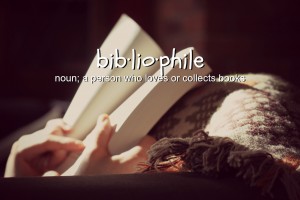35 Expressions Every Bibliophile Should Know

bibliophile
noun bib·lio·phile \ˈbi-blē-ə-ˌfī(-ə)l\
: a person who loves or collects books
From Merriam-Webster
If you didn’t skip the first few lines of this post, you already know a new word for “book lover” already. But there are more terms and expressions all bookworms, bibliophiles, and passionate reader should know.
Check out these 35 words and expressions a book lover should know and add to his or her vocabulary!
People & Persons
- Bibliobibuli – a person who reads too much
- Biblioclast – a person who destroys or mutilates books
- Bibliognost – a person with extensive knowledge of books
- Biblioklept – a person who steals books
- Bibliophagist – a person who reads a lot (literally: devours books)
- Bibliotaph – a person who hoards and hides books
- Book-Bosomed – a person who doesn’t leave the house without carrying a book with them
- Librocubicularist – a person who reads in bed
- Literarian – a person who’s well-read in literature
- Morosph – a learned fool; often someone who talks about things they have no clue about
- Ultracrepidarian – a person who criticizes, advises on, or judges topics they have close to no knowledge of
Rhetorical Devices & Kinds Of Literature
- Amphigouri – a comic poem compose using a nonsense-language
- Aphorism – a short and concise statement that expresses a statement or idea
- Bildungsroman – a book revolving around a coming-of-age story; German
- Clerihew – a quirky kind of poem, consisting of four lines with the AABB rhyme scheme; named after Edmund Clerihew Bentley
- Epistolary – a novel written by using letters, documents, and different kinds of correspondence
- Fascicle – an independent part or book in a series
- Hamartia – an error or flaw of a book or story’s protagonist that leads to their downfall
- Incunable – a piece of writing that was printed (1) before the year 1501
- In Medias Res – a way of beginning a story in the middle of the action, revealing the background via back-telling
- Malapropism – the act of replacing a correct word in a text with a similar sounding one
- Roman À Clef – a piece of fictional work that is really based on real life, masked with the fictional aspect
- Synecdoche – a figure of speech in which a term stands for a whole something
- Unreliable Narrator – the narrator of a story that misleads the reader to see things the way the narrator wants to, which is not the reflection of the reality in the story
Literary Characters
- Byronic Hero – the protagonist of a book that indulges in flawed, disrespectful, or self-destructive behavior and isolates him or herself from the world; named after Lord Byron
- Deuteragonist – the second most important character in a book or story
- Foil – a secondary character who’s used to emphasize the traits and characteristics of the protagonist
- Protagonist – the most important character in a book or story
Other Literary Terms
- Bibliolatry – the extraordinary worship of a particular book or story, or books in general
- Bowdlerize – the (unnecessary) act of removing parts of or meddling with a text that makes it less strong or even ineffective; named after Thomas Bowdler
- Death Of The Author – a term referring to leaving out the author’s intention when interpreting a literary piece
- Epeolatry – the worship of words
- Finifugal – the act of shunning the end (of a book, movie, etc.)
- Libricide – the destruction of books
- Tsundoku – the act of buying books, but never reading them; Japanese
